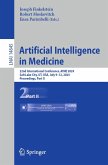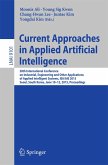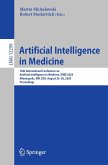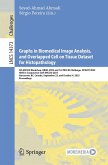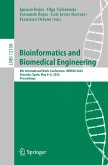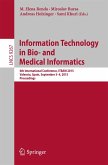Artificial Intelligence in Medicine (eBook, PDF)
22nd International Conference, AIME 2024, Salt Lake City, UT, USA, July 9-12, 2024, Proceedings, Part I
Redaktion: Finkelstein, Joseph; Parimbelli, Enea; Moskovitch, Robert


Alle Infos zum eBook verschenken

Artificial Intelligence in Medicine (eBook, PDF)
22nd International Conference, AIME 2024, Salt Lake City, UT, USA, July 9-12, 2024, Proceedings, Part I
Redaktion: Finkelstein, Joseph; Parimbelli, Enea; Moskovitch, Robert
- Format: PDF
- Merkliste
- Auf die Merkliste
- Bewerten Bewerten
- Teilen
- Produkt teilen
- Produkterinnerung
- Produkterinnerung

Hier können Sie sich einloggen

Bitte loggen Sie sich zunächst in Ihr Kundenkonto ein oder registrieren Sie sich bei bücher.de, um das eBook-Abo tolino select nutzen zu können.
This two-volume set LNAI 14844-14845 constitutes the refereed proceedings of the 22nd International Conference on Artificial Intelligence in Medicine, AIME 2024, held in Salt Lake City, UT, USA, during July 9-12, 2024.
The 54 full papers and 22 short papers presented in the book were carefully reviewed and selected from 335 submissions.
The papers are grouped in the following topical sections:
Part I: Predictive modelling and disease risk prediction; natural language processing; bioinformatics and omics; and wearable devices, sensors, and robotics.
Part II: Medical imaging…mehr
- Geräte: PC
- ohne Kopierschutz
- eBook Hilfe
- Größe: 39.16MB
![Artificial Intelligence in Medicine (eBook, PDF) Artificial Intelligence in Medicine (eBook, PDF)]() Artificial Intelligence in Medicine (eBook, PDF)53,95 €
Artificial Intelligence in Medicine (eBook, PDF)53,95 €![Current Approaches in Applied Artificial Intelligence (eBook, PDF) Current Approaches in Applied Artificial Intelligence (eBook, PDF)]() Current Approaches in Applied Artificial Intelligence (eBook, PDF)40,95 €
Current Approaches in Applied Artificial Intelligence (eBook, PDF)40,95 €![Artificial Intelligence and Soft Computing (eBook, PDF) Artificial Intelligence and Soft Computing (eBook, PDF)]() Artificial Intelligence and Soft Computing (eBook, PDF)61,95 €
Artificial Intelligence and Soft Computing (eBook, PDF)61,95 €![Artificial Intelligence in Medicine (eBook, PDF) Artificial Intelligence in Medicine (eBook, PDF)]() Artificial Intelligence in Medicine (eBook, PDF)40,95 €
Artificial Intelligence in Medicine (eBook, PDF)40,95 €![Graphs in Biomedical Image Analysis, and Overlapped Cell on Tissue Dataset for Histopathology (eBook, PDF) Graphs in Biomedical Image Analysis, and Overlapped Cell on Tissue Dataset for Histopathology (eBook, PDF)]() Graphs in Biomedical Image Analysis, and Overlapped Cell on Tissue Dataset for Histopathology (eBook, PDF)40,95 €
Graphs in Biomedical Image Analysis, and Overlapped Cell on Tissue Dataset for Histopathology (eBook, PDF)40,95 €![Bioinformatics and Biomedical Engineering (eBook, PDF) Bioinformatics and Biomedical Engineering (eBook, PDF)]() Bioinformatics and Biomedical Engineering (eBook, PDF)73,95 €
Bioinformatics and Biomedical Engineering (eBook, PDF)73,95 €![Information Technology in Bio- and Medical Informatics (eBook, PDF) Information Technology in Bio- and Medical Informatics (eBook, PDF)]() Information Technology in Bio- and Medical Informatics (eBook, PDF)32,95 €
Information Technology in Bio- and Medical Informatics (eBook, PDF)32,95 €-
-
-
The 54 full papers and 22 short papers presented in the book were carefully reviewed and selected from 335 submissions.
The papers are grouped in the following topical sections:
Part I: Predictive modelling and disease risk prediction; natural language processing; bioinformatics and omics; and wearable devices, sensors, and robotics.
Part II: Medical imaging analysis; data integration and multimodal analysis; and explainable AI.
Dieser Download kann aus rechtlichen Gründen nur mit Rechnungsadresse in A, B, BG, CY, CZ, D, DK, EW, E, FIN, F, GR, HR, H, IRL, I, LT, L, LR, M, NL, PL, P, R, S, SLO, SK ausgeliefert werden.
- Produktdetails
- Verlag: Springer International Publishing
- Seitenzahl: 418
- Erscheinungstermin: 25. Juli 2024
- Englisch
- ISBN-13: 9783031665387
- Artikelnr.: 72240908
- Verlag: Springer International Publishing
- Seitenzahl: 418
- Erscheinungstermin: 25. Juli 2024
- Englisch
- ISBN-13: 9783031665387
- Artikelnr.: 72240908
- Herstellerkennzeichnung Die Herstellerinformationen sind derzeit nicht verfügbar.
.- Applying Gaussian Mixture Model for clustering analysis of emergency room patients based on intubation status.
.- Bayesian Neural Network to predict antibiotic resistance.
.- Boosting multitask decomposition: directness, sequentiality, subsampling, cross-gradients.
.- Diagnostic Modeling to Identify Unrecognized Inpatient Hypercapnia Using Health Record Data.
.- Enhancing Hypotension Prediction in Real-time Patient Monitoring Through Deep Learning: A Novel Application of XResNet with Contrastive Learning and Value Attention Mechanisms.
.- Evaluating the TMR model for multimorbidity decision support using a community-of-practice based methodology.
.- Frequent patterns of childhood overweight from longitudinal data on parental and early-life of infants health.
.- Fuzzy neural network model based on uni-nullneuron in extracting knowledge about risk factors of Maternal Health.
.- Identifying Factors Associated with COVID-19 All-Cause 90-Day Readmission: Machine Learning Approaches.
.- Mining Disease Progression Patterns for Advanced Disease Surveillance.
.- Minimizing Survey Questions for PTSD Prediction Following Acute Trauma.
.- Patient-Centric Approach for Utilising Machine Learning to Predict Health-Related Quality of Life Changes during Chemotherapy.
.- Predicting Blood Glucose Levels with LMU Recurrent Neural Networks: A Novel Computational Model.
.- Prediction Modelling and Data Quality Assessment for Nursing Scale in a big hospital: a proposal to save resources and improve data quality.
.- Process Mining for capacity planning and reconfiguration of a logistics system to enhance the intra-hospital patient transport. Case Study..
.- Radiotherapy Dose Optimization via Clinical Knowledge Based Reinforcement Learning.
.- Reinforcement Learning with Balanced Clinical Reward for Sepsis Treatment.
.- Secure and Private Vertical Federated Learning for Predicting Personalized CVA Outcomes.
.- Smoking Status Classification: A Comparative Analysis of Machine Learning Techniques with Clinical Real World Data.
.- The Impact of Data Augmentation on Time Series Classification Models: An In-Depth Study with Biomedical Data.
.- The Impact of Synthetic Data on Fall Detection Application.
.- Natural Language Processing.
.- A Retrieval-Augmented Generation Strategy To Enhance Medical Chatbot Reliability.
.- Beyond Self-Consistency: Ensemble Reasoning Boosts Consistency and Accuracy of LLMs in Cancer Staging.
.- Clinical Reasoning over Tabular Data and Text with Bayesian Networks.
.- Empowering Language Model with Guided Knowledge Fusion for Biomedical Document Re-ranking.
.- Enhancing Abstract Screening Classification in Evidence-Based Medicine: Incorporating domain knowledge into pre-trained models.
.- Exploring Pre-trained Language Models for Vocabulary Alignment in the UMLS.
.- ICU Bloodstream Infection Prediction: A Transformer-Based Approach for EHR Analysis.
.- Modeling multiple adverse pregnancy outcomes: Learning from diverse data sources.
.- OptimalMEE: Optimizing Large Language Models for Medical Event Extraction through Fine-tuning and Post-hoc Verification.
.- Self-Supervised Segment Contrastive Learning for Medical Document Representation 295.
.- Sentence-aligned Simplification of Biomedical Abstracts.
.- Sequence-Model-Based Medication Extraction from Clinical Narratives in German.
.- Social Media as a Sensor: Analyzing Twitter Data for Breast Cancer Medication Effects Using Natural Language Processing.
.- Bioinformatics and omics.
.- Breast cancer subtype prediction model integrating domain adaptation with semi-supervised learning on DNA methylation profiles.
.- CI-VAE for Single-Cell: Leveraging Generative-AI to Enhance Disease Understanding.
.- ProteinEngine: Empower LLM with Domain Knowledge for Protein Engineering.
.- Wearable devices, sensors, and robotics.
.- Advancements in Non-Invasive AI-Powered Glucose Monitoring: Leveraging Multispectral Imaging Across Diverse Wavelengths.
.- Anticipating Stress: Harnessing Biomarker Signals from a Wrist-worn Device for Early Prediction.
.- Improving Reminder Apps for Home Voice Assistants.
.- Applying Gaussian Mixture Model for clustering analysis of emergency room patients based on intubation status.
.- Bayesian Neural Network to predict antibiotic resistance.
.- Boosting multitask decomposition: directness, sequentiality, subsampling, cross-gradients.
.- Diagnostic Modeling to Identify Unrecognized Inpatient Hypercapnia Using Health Record Data.
.- Enhancing Hypotension Prediction in Real-time Patient Monitoring Through Deep Learning: A Novel Application of XResNet with Contrastive Learning and Value Attention Mechanisms.
.- Evaluating the TMR model for multimorbidity decision support using a community-of-practice based methodology.
.- Frequent patterns of childhood overweight from longitudinal data on parental and early-life of infants health.
.- Fuzzy neural network model based on uni-nullneuron in extracting knowledge about risk factors of Maternal Health.
.- Identifying Factors Associated with COVID-19 All-Cause 90-Day Readmission: Machine Learning Approaches.
.- Mining Disease Progression Patterns for Advanced Disease Surveillance.
.- Minimizing Survey Questions for PTSD Prediction Following Acute Trauma.
.- Patient-Centric Approach for Utilising Machine Learning to Predict Health-Related Quality of Life Changes during Chemotherapy.
.- Predicting Blood Glucose Levels with LMU Recurrent Neural Networks: A Novel Computational Model.
.- Prediction Modelling and Data Quality Assessment for Nursing Scale in a big hospital: a proposal to save resources and improve data quality.
.- Process Mining for capacity planning and reconfiguration of a logistics system to enhance the intra-hospital patient transport. Case Study..
.- Radiotherapy Dose Optimization via Clinical Knowledge Based Reinforcement Learning.
.- Reinforcement Learning with Balanced Clinical Reward for Sepsis Treatment.
.- Secure and Private Vertical Federated Learning for Predicting Personalized CVA Outcomes.
.- Smoking Status Classification: A Comparative Analysis of Machine Learning Techniques with Clinical Real World Data.
.- The Impact of Data Augmentation on Time Series Classification Models: An In-Depth Study with Biomedical Data.
.- The Impact of Synthetic Data on Fall Detection Application.
.- Natural Language Processing.
.- A Retrieval-Augmented Generation Strategy To Enhance Medical Chatbot Reliability.
.- Beyond Self-Consistency: Ensemble Reasoning Boosts Consistency and Accuracy of LLMs in Cancer Staging.
.- Clinical Reasoning over Tabular Data and Text with Bayesian Networks.
.- Empowering Language Model with Guided Knowledge Fusion for Biomedical Document Re-ranking.
.- Enhancing Abstract Screening Classification in Evidence-Based Medicine: Incorporating domain knowledge into pre-trained models.
.- Exploring Pre-trained Language Models for Vocabulary Alignment in the UMLS.
.- ICU Bloodstream Infection Prediction: A Transformer-Based Approach for EHR Analysis.
.- Modeling multiple adverse pregnancy outcomes: Learning from diverse data sources.
.- OptimalMEE: Optimizing Large Language Models for Medical Event Extraction through Fine-tuning and Post-hoc Verification.
.- Self-Supervised Segment Contrastive Learning for Medical Document Representation 295.
.- Sentence-aligned Simplification of Biomedical Abstracts.
.- Sequence-Model-Based Medication Extraction from Clinical Narratives in German.
.- Social Media as a Sensor: Analyzing Twitter Data for Breast Cancer Medication Effects Using Natural Language Processing.
.- Bioinformatics and omics.
.- Breast cancer subtype prediction model integrating domain adaptation with semi-supervised learning on DNA methylation profiles.
.- CI-VAE for Single-Cell: Leveraging Generative-AI to Enhance Disease Understanding.
.- ProteinEngine: Empower LLM with Domain Knowledge for Protein Engineering.
.- Wearable devices, sensors, and robotics.
.- Advancements in Non-Invasive AI-Powered Glucose Monitoring: Leveraging Multispectral Imaging Across Diverse Wavelengths.
.- Anticipating Stress: Harnessing Biomarker Signals from a Wrist-worn Device for Early Prediction.
.- Improving Reminder Apps for Home Voice Assistants.

